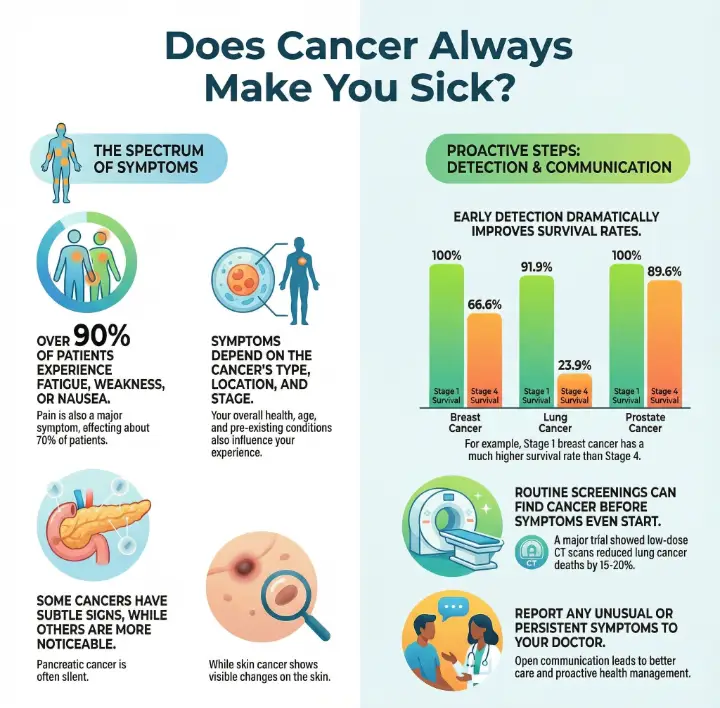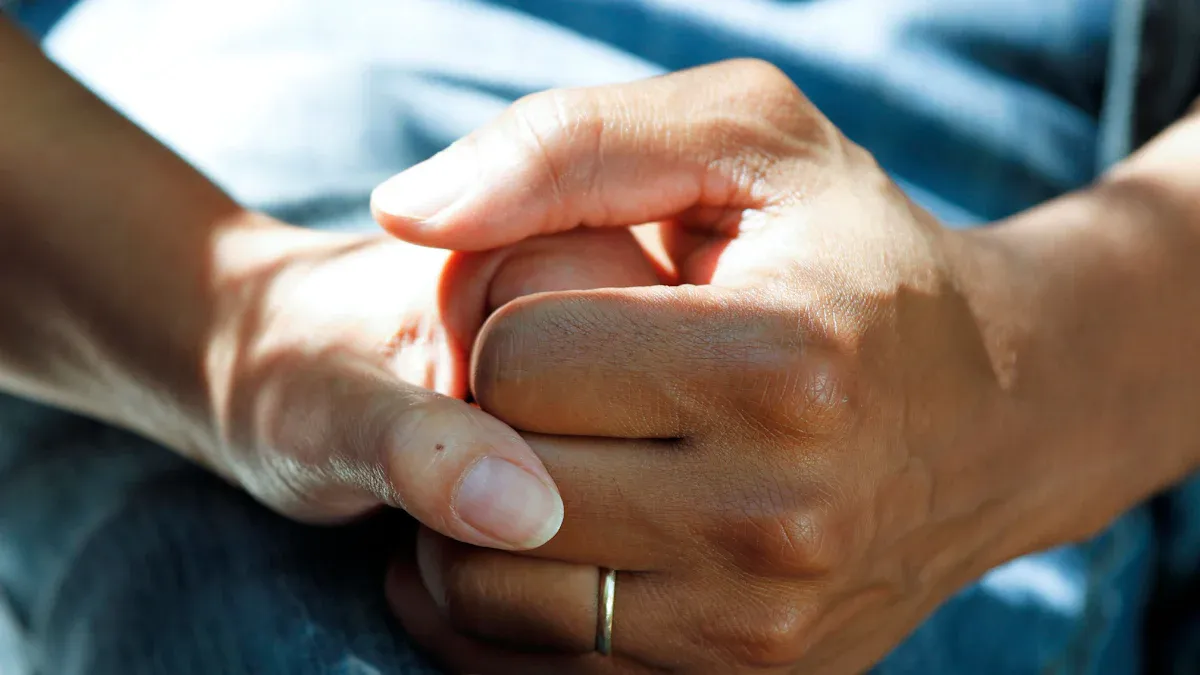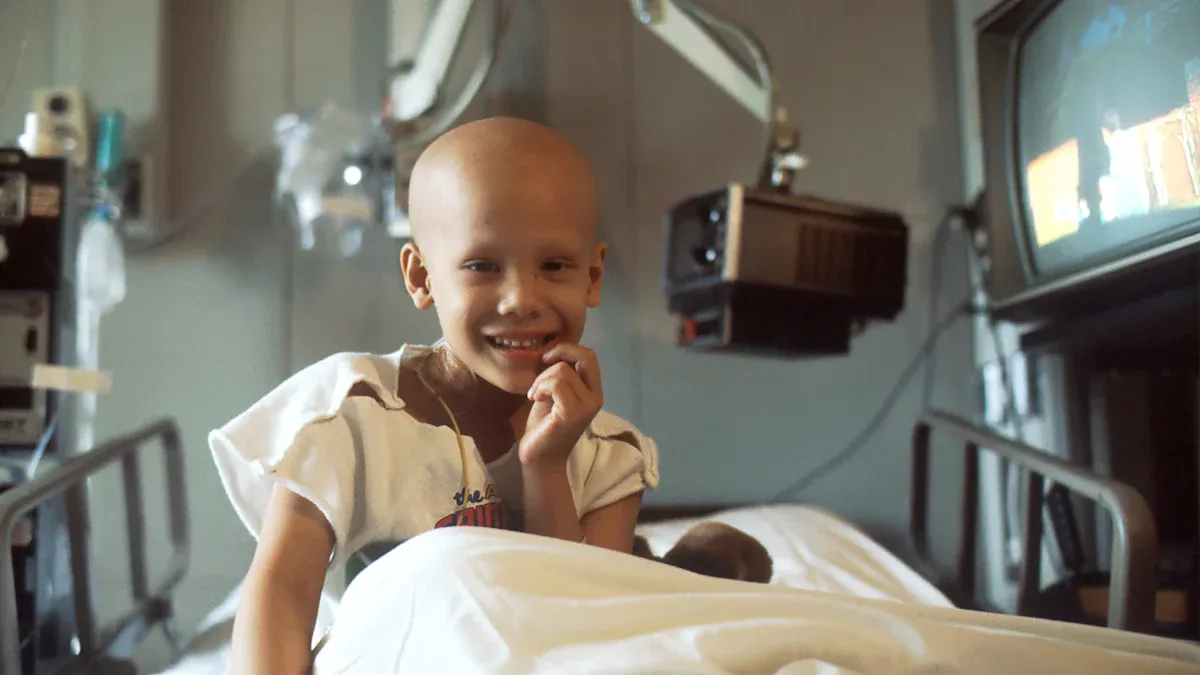Does Cancer Always Make You Feel Sick?

Cancer doesn’t always make you feel sick. Symptoms depend on factors like the type of cancer, its stage, and your overall health. Some cancers, especially slow-growing ones, may not cause harm or require treatment during your lifetime. For example:
19% of breast cancers detected through screening are overdiagnosed, meaning they may never lead to symptoms.
20% to 50% of prostate cancers identified through screening are also overdiagnosed.
If you have cancer, symptoms may vary widely, and early detection plays a key role in improving outcomes.
Key Takeaways
Cancer signs differ depending on type, stage, and your health. Some cancers show no clear signs.
Finding cancer early with tests can help treatments work better. It can also raise survival chances. Take care of your health.
Handling side effects from treatments like chemo and radiation is important. Talk to your doctor for ways to feel better.
Healthy habits, like eating well and exercising, can ease symptoms. They also make life better during cancer care.
Talking openly with your doctor about symptoms helps a lot. It leads to better care and support during your cancer treatment.
How Cancer Can Cause Symptoms

Common Symptoms
Fatigue and Weakness
You may feel unusually tired or weak if you have cancer. This happens because cancer cells consume your body’s energy, leaving you drained. Treatments like chemotherapy can also worsen fatigue. According to studies, tiredness and weakness affect over 90% of cancer patients.
Symptom | Incidence (%) |
|---|---|
Nausea following treatment | 93 |
Weakness | 92 |
Tiredness | 92 |
Anxiety | 92 |
Depression | 91 |
Pain and Discomfort
Pain often depends on the cancer’s location. For instance, bone cancer may cause severe aches, while abdominal cancers can lead to cramping. Pain can also result from tumors pressing on nerves or organs. Severe pain affects about 70% of patients, making it one of the most challenging symptoms to manage.
Nausea and Appetite Changes
Nausea is a common side effect of cancer treatments like chemotherapy. It affects 93% of patients, often leading to appetite loss. You might notice weight changes as a result. Managing nausea with medications and dietary adjustments can help improve your quality of life.
Why Symptoms Differ
Cancer Type and Location
Symptoms vary based on the type and location of cancer. For example, lung cancer may cause persistent coughing, while skin cancer often presents as visible changes on the skin. The affected organ determines how your body reacts.
Stage and Progression
Early-stage cancers may not cause noticeable symptoms. However, as cancer progresses, symptoms often become more severe. Survival rates also differ by stage. For instance, breast cancer has a 100% survival rate at Stage 1 but drops to 66.6% at Stage 4.
Cancer Type | Stage 1 Survival | Stage 4 Survival |
|---|---|---|
Breast Cancer | 100% | 66.6% |
Lung Cancer | 91.9% | 23.9% |
Prostate Cancer | 100% | 89.6% |
Individual Health Factors
Your overall health plays a significant role in how symptoms manifest. Age, pre-existing conditions, and lifestyle choices can influence your experience. If you have cancer, maintaining a healthy lifestyle may help reduce symptom severity.

The Role of Cancer Treatments
Chemotherapy Side Effects
Nausea and Vomiting
Chemotherapy often causes nausea and vomiting, which can disrupt your daily life. These side effects occur because chemotherapy targets rapidly dividing cells, including those in your digestive system. A survey of 814 individuals undergoing chemotherapy revealed that 63% experienced nausea and vomiting during treatment. Managing these symptoms with anti-nausea medications and dietary changes can help you feel more comfortable.
Fatigue and Hair Loss
Fatigue is one of the most common side effects of chemotherapy, affecting 87% of patients. It can leave you feeling drained and unable to perform routine tasks. Hair loss is another frequent side effect, as chemotherapy damages hair follicles. While these effects can be distressing, they are usually temporary. Many patients find that their energy levels and hair growth return after treatment ends.
Side Effect | Frequency (%) | Severity Level |
|---|---|---|
Fatigue | 87 | Common |
Loss of appetite | 71.4 | Common |
Diarrhea | 49.4 | Common |
Six or more side effects | 66.7 | Common |

Radiation Therapy Effects
Skin Irritation
Radiation therapy can cause skin irritation, including redness, peeling, and sensitivity. These effects occur because radiation damages healthy skin cells near the treatment area. Most skin-related side effects are temporary and improve within weeks after treatment ends. Using gentle skincare products can help soothe irritation.
Fatigue and Localized Pain
Fatigue is also a common side effect of radiation therapy. It may result from the body repairing itself after exposure to radiation. Localized pain can occur in the treated area, depending on the location and dose of radiation. For example, abdominal radiation may lead to stomach discomfort. A study tracking 234 patients found that side effects like pain and diarrhea were frequently reported, emphasizing the importance of patient feedback in managing these symptoms.
Side Effect Type | Description | Duration |
|---|---|---|
Fatigue, skin changes, hair loss, mouth problems | Short-term, usually gone within weeks | |
Late Side Effects | Can occur in any normal tissue, risk depends on area treated and dose | Months to years to develop |
Other Treatments
Immunotherapy and Flu-like Symptoms
Immunotherapy boosts your immune system to fight cancer, but it can cause flu-like symptoms such as fever, chills, and fatigue. These effects occur because your immune system becomes more active. While these symptoms can be uncomfortable, they often indicate that the treatment is working.
Surgery and Recovery Challenges
Surgery can be an effective way to remove cancer, but it comes with recovery challenges. You may experience pain, fatigue, or limited mobility after surgery. Emotional impacts are also common. Patients in the metastatic setting often feel pressured to make quick decisions about surgery, viewing it as essential for survival. Recovery times vary, but following your doctor’s advice can help you heal faster.
Tip: If you have cancer, discussing potential side effects with your healthcare provider can help you prepare for treatment and recovery.
If You Have Cancer: Symptoms and Screenings
Cancers With Subtle Symptoms
Pancreatic Cancer
Pancreatic cancer often develops silently, making it difficult to detect early. Symptoms like mild abdominal discomfort or unexplained weight loss may seem unrelated. These signs often appear only after the disease has progressed. This lack of early warning highlights the importance of paying attention to even minor changes in your health.
Ovarian Cancer
Ovarian cancer also presents subtle symptoms that are easy to overlook.
Persistent bloating or abdominal swelling may occur.
Changes in bowel or bladder habits, such as increased urgency, can signal a problem.
Dr. Butler emphasizes the need to stay attuned to your body to recognize these abnormalities.
Dr. Magtibay notes that these early signs often go unnoticed, delaying diagnosis. If you have cancer with such subtle symptoms, early detection becomes even more critical.
Cancers With Noticeable Symptoms
Lung Cancer and Persistent Cough
Lung cancer often causes a persistent cough that doesn’t go away. You might also experience shortness of breath or chest pain. These symptoms are more noticeable, which can lead to earlier detection. However, only 14% of lung cancers are diagnosed through screening, leaving many cases undetected until later stages.
Skin Cancer and Visible Changes
Skin cancer typically shows visible changes, such as new moles or alterations in existing ones. You should monitor your skin for unusual growths or discoloration. Early detection significantly improves outcomes, as survival rates are much higher in the early stages.
Cancer Type | Detection Rate by Screening | Survival Rate (Early vs Late Stage) |
|---|---|---|
Lung Cancer | 4 times higher in early stage vs late stage | |
Other Cancers | Varies | Varies |
Cancers without Screening | 57% of diagnosed cancers | Typically found in later stages, harder to treat |
Importance of Screenings
Detecting Cancer Early
Routine screenings can save lives. The National Lung Screening Trial (NLST) found that low-dose spiral CT scans reduced lung cancer deaths by 15% to 20% in heavy smokers. Early detection allows for more effective treatment and better outcomes. Even small reductions in mortality rates from screenings can make a significant difference.
Routine Check-ups
Regular check-ups help identify cancer before symptoms appear. If you have cancer, early detection through screenings can improve your chances of recovery. Staying proactive with your health ensures that any abnormalities are addressed promptly.
Note: Always consult your healthcare provider about the screenings appropriate for your age and risk factors.
Early Detection and Communication

Why Early Detection Matters
Improved Treatment Outcomes
Detecting cancer early can significantly improve your chances of successful treatment. Early-stage cancers are often smaller and easier to treat. For example, localized cancers may be removed surgically or treated with less aggressive therapies. This can lead to better survival rates and fewer long-term complications. Early detection also allows you to explore more treatment options, giving you greater control over your care.
Reduced Symptom Severity
Early detection can help reduce the severity of symptoms you experience. When cancer is caught early, it may not have spread to other parts of your body. This can prevent more severe symptoms from developing.
Length bias indicates that screenings often identify slower-growing cancers, which may not represent the overall severity of cases.
Despite these considerations, early detection remains crucial for managing symptoms and improving quality of life.
Talking to Healthcare Providers
Reporting Unusual Symptoms
You should always report unusual symptoms to your healthcare provider. Symptoms like unexplained weight loss, persistent pain, or changes in your body could indicate a problem. Open communication ensures that your concerns are addressed promptly. If you have cancer, discussing symptoms early can lead to quicker interventions and better management of your condition.
Asking About Screenings
Screenings are vital for detecting cancer before symptoms appear. Ask your healthcare provider about screenings appropriate for your age, family history, and risk factors. Regular screenings can help identify cancers like breast, colon, or lung cancer in their early stages. This proactive approach can make a significant difference in your treatment outcomes.
In a study published in the Journal of Clinical Oncology, women undergoing pelvic radiation reported side effects more frequently through the PRO-CTCAE system than through clinician reports. Dr. Sandra Mitchell emphasized that better communication about patient experiences enhances care, builds trust, and reduces fear about symptoms.
Managing Symptoms
Supportive Care Options
Supportive care can help you manage cancer symptoms and treatment side effects. Options include pain management, physical therapy, and counseling. These services aim to improve your quality of life and address both physical and emotional challenges. If you have cancer, supportive care can make your journey more manageable.
Lifestyle Changes
Lifestyle changes can also play a role in managing symptoms. Eating a balanced diet, staying physically active, and getting enough rest can help you feel better. Avoiding tobacco and limiting alcohol consumption can further support your overall health. Small adjustments to your daily routine can have a big impact on how you cope with cancer and its treatments.
Cancer doesn’t always make you feel sick. Symptoms depend on factors like the type, stage, and your overall health. Treatments often cause side effects, but supportive care can help you manage them effectively.
Early detection plays a vital role in improving outcomes. Regular screenings and open communication with your healthcare provider can make a significant difference.
Evidence Type | Findings |
|---|---|
Side Effects | Higher rates of side effects in clinical practice than in clinical trials. |
Patient Age | Younger patients report fewer side effects due to better tolerance. |
Treatment Efficacy | Older patients may receive lower doses, reducing side effects but impacting efficacy. |
Every person’s experience with cancer is unique. With the right support, you can manage symptoms and improve your quality of life.
FAQ
What are the early signs of cancer you should watch for?
Early signs include unexplained weight loss, persistent fatigue, or unusual lumps. You might also notice changes in your skin, bowel habits, or persistent pain. Pay attention to these symptoms and consult your doctor if they persist.
Can cancer symptoms come and go?
Yes, some symptoms may appear intermittently. For example, mild pain or fatigue might fluctuate. However, recurring symptoms should not be ignored. Always report them to your healthcare provider for evaluation.
Does every cancer patient experience pain?
No, not all cancer patients feel pain. Pain depends on the cancer’s type, location, and stage. Some cancers remain painless, especially in early stages. If you experience discomfort, pain management options are available.
How can you manage nausea during cancer treatment?
You can manage nausea by eating small, bland meals and staying hydrated. Anti-nausea medications prescribed by your doctor can also help. Avoid strong smells or foods that trigger nausea.
Is it possible to live a normal life with cancer?
Yes, many people live fulfilling lives with cancer. Supportive care, lifestyle changes, and effective treatments can improve your quality of life. Staying proactive about your health and maintaining a positive outlook can make a big difference.
Tip: Always communicate openly with your healthcare team to address symptoms and improve your well-being.
This article is for educational purposes only and is not a substitute for professional medical advice. For more details, please see our Disclaimer. To understand how we create and review our content, please see our Editorial Policy.
#BanishCancer
See Also
Identifying Key Signs of Kidney Cancer You Should Know
Recognizing Symptoms Associated With Hypopharyngeal Cancer
Exploring Symptoms and Causes of Esophageal Cancer

